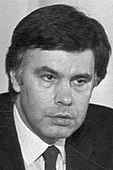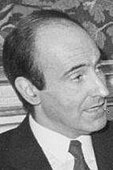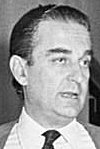
Back Eleccions generals espanyoles de 1982 Catalan Parlamentswahl in Spanien 1982 German Elecciones generales de España de 1982 Spanish 1982ko Espainiako hauteskunde orokorrak Basque Élections générales espagnoles de 1982 French Eleccións xerais de España de 1982 Galician Elezioni generali in Spagna del 1982 Italian 1982年スペイン総選挙 Japanese Wybory parlamentarne w Hiszpanii w 1982 roku Polish Eleições gerais na Espanha em 1982 Portuguese
| |||||||||||||||||||||||||||||||||||||||||||||||||||||||||||||||||||||||||||||||||||||||||||||
All 350 seats in the Congress of Deputies and 208 (of 254) seats in the Senate 176[a] seats needed for a majority in the Congress of Deputies | |||||||||||||||||||||||||||||||||||||||||||||||||||||||||||||||||||||||||||||||||||||||||||||
|---|---|---|---|---|---|---|---|---|---|---|---|---|---|---|---|---|---|---|---|---|---|---|---|---|---|---|---|---|---|---|---|---|---|---|---|---|---|---|---|---|---|---|---|---|---|---|---|---|---|---|---|---|---|---|---|---|---|---|---|---|---|---|---|---|---|---|---|---|---|---|---|---|---|---|---|---|---|---|---|---|---|---|---|---|---|---|---|---|---|---|---|---|---|
| Opinion polls | |||||||||||||||||||||||||||||||||||||||||||||||||||||||||||||||||||||||||||||||||||||||||||||
| Registered | 26,846,940 | ||||||||||||||||||||||||||||||||||||||||||||||||||||||||||||||||||||||||||||||||||||||||||||
| Turnout | 21,469,274 (80.0%) | ||||||||||||||||||||||||||||||||||||||||||||||||||||||||||||||||||||||||||||||||||||||||||||
| |||||||||||||||||||||||||||||||||||||||||||||||||||||||||||||||||||||||||||||||||||||||||||||
 Election results by Congress of Deputies constituency | |||||||||||||||||||||||||||||||||||||||||||||||||||||||||||||||||||||||||||||||||||||||||||||
| |||||||||||||||||||||||||||||||||||||||||||||||||||||||||||||||||||||||||||||||||||||||||||||
The 1982 Spanish general election was held on Thursday, 28 October 1982, to elect the 2nd Cortes Generales of the Kingdom of Spain. All 350 seats in the Congress of Deputies were up for election, as well as 208 of 254 seats in the Senate.
The election was called several months ahead of schedule on 27 August 1982, by the then Prime Minister Leopoldo Calvo-Sotelo, amid poor opinion poll ratings and severe infighting within his party, the Union of the Democratic Centre (UCD), that had seen the splits of former prime minister Adolfo Suárez's Democratic and Social Centre (CDS), Óscar Alzaga's People's Democratic Party (PDP) and the Democratic Action Party (PAD) of former minister Francisco Fernández Ordóñez.[1][2] The closing legislature had been characterized by political instability and the effects of an economic downturn resulting from the 1979 oil crisis: Suárez himself had resigned the premiership in January 1981 as a result of the ongoing UCD crisis, a military coup d'etat attempt had been thwarted during Calvo-Sotelo's investiture on 23 February 1981, and the UCD had become increasingly isolated during the administrative set up of the so-called "state of the autonomies", both parliamentarily—a result of its minority status and continuous defections—and politically, having been routed in every regional election held since 1979: the Basque Country, Catalonia, Galicia and Andalusia.[3][4] Calvo-Sotelo himself had chosen not to run for re-election.
The Spanish Socialist Workers' Party (PSOE) led by Felipe González won the largest landslide victory in a Spanish democratic election, with 48.1% of the vote and a strong majority of 202 out of 350 seats in the Congress, by running a mainstream modern social democratic campaign and appealing to political change. The UCD, on the other hand, was decimated, losing 93% of its 1979 seats and roughly 80% of its 1979 vote—still the worst defeat that a sitting government has suffered since the restoration of democracy, and one of the worst defeats ever suffered by a governing party in the Western world. The right-wing People's Alliance (AP), led into the election by former Francoist minister Manuel Fraga, benefitted greatly from the UCD's losses, becoming the main opposition party to the Socialists with slightly over 100 seats and 26.4% of the vote. Adolfo Suárez's CDS had a modest entry into the Congress with 2 seats and 2.9% of the vote, while the Communist Party of Spain (PCE) vote plummeted, suffering from tactical voting to the PSOE. Turnout remains, at 79.97%, the highest ever recorded in a general election held in Spain to date. The 1982 election was the last general election to be held on a day other than Sunday.
González took office on 2 December, heading the first government in 43 years in which none of its members had served under Francoism.[5]
Cite error: There are <ref group=lower-alpha> tags or {{efn}} templates on this page, but the references will not show without a {{reflist|group=lower-alpha}} template or {{notelist}} template (see the help page).
- ^ "Preocupación en UCD por la 'mala imagen' que da Calvo Sotelo". El País (in Spanish). 11 August 1982. Retrieved 27 August 2019.
- ^ "Calvo Sotelo disuelve el Parlamento y convoca elecciones generales para el 28 de octubre". El País (in Spanish). 28 August 1982. Retrieved 27 August 2019.
- ^ "Cronología de la legislatura". El País (in Spanish). 28 August 1982. Retrieved 27 August 2019.
- ^ "El 23-F y la moción de censura contra Suárez, hechos claves de las últimas Cortes". El País (in Spanish). 28 August 1982. Retrieved 27 August 2019.
- ^ The administration of Felipe González, 1982-96 at Encyclopedia Britannica
© MMXXIII Rich X Search. We shall prevail. All rights reserved. Rich X Search





